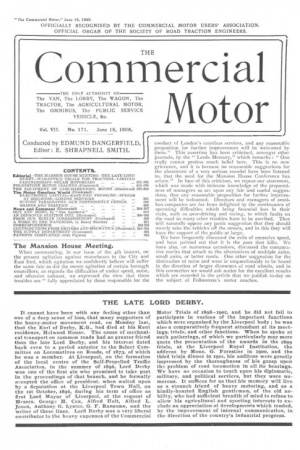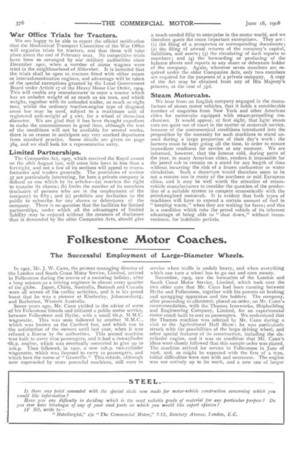The Mansion House Meeting.
Page 1

Page 2

If you've noticed an error in this article please click here to report it so we can fix it.
When commenting, in our issue of the 4th instant, on the present agitation against motorbuses in the City and East End, which agitation we confidently believe will suffer the same fate as did the recent agitation of certain borough councillors, as regards the difficulties of undue speed, noise, and offensive exhaust, we expressed the view that these troubles are " fully appreciated by those responsible for the conduct of London's omnibus services, and any reasonable proposition for further improvement will be welcomed by them." This assertion has been criticised, amongst other journals, by the " Leeds Mercury," which remarks : " One really cannot profess much belief here. This is no new grievance, and it is because no reasonable suggestions for the abatement of a very serious scandal have been listened to, that the need for the Mansion House Conference has arisen." In face of this criticism, we repeat our statement, which was made with intimate knowledge Of the preparedness of managers to act -upon any fair and useful suggestions, that any reasonable proposition for further improvement will be welcomed. Directors and managers of omnibus companies are far from delighted by the continuance of operating difficulties which bring financial loss in their train, such as over-driving and racing, to which faults on the road so many other troubles have to be ascribed. They will naturally oppose any panic suggestion that they should merely take the vehicles off the streets, and in this they will have the support of the public at large.
We have frequently discussed the evils of excessive Speed, and have pointed out that it is the pace that kills. We have also, on numerous occasions, discussed the comparative merits that attach to the alternatives of multiple axles, small units, or better roads. One other Suggestion for the diminution of noise and wear is unquestionably to be found in the direction of larger diameters of road-wheels, and in this connection we would ask notice for the excellentresults which are recorded in the article that we publish to-day on the subject of Folkestone's motor coaches.
War Office Trials for Tractors.
We are happy to be able to report the official notification that the Mechanical Transport Committee of the War Office will organise trials for tractors, and that these will take place about the end of February next. No competitive trials ,have been so arranged by our military authorities since December 1901, when a number of motor wagons were tried in the neighbourhood of Aldershot. It is intended that the trials shall be open to tractors fitted with either steam -or internal-combustion engines, and advantage will be taken .of the special exemptions granted by the Local Government Board under Article 17 of the Heavy Motor Car Order, 1904. This will enable any manufacturer to enter a tractor which has an unladen weight of as much as six tons, and which weighs, together with its unloaded trailer, as much as eight tons, whilst the ordinary traction-engine type of diagonal scross bar may be used, subject to a maximum unit of registered axle-weight of 5 cwt. for a wheel of three-foot .diameter. We are glad that it has been thought expedient to make the announcement in good time, although the text -of the conditions will not be available for several weeks, there is no reason to anticipate any very marked departures from standard practice. Some details are given on page 384, and we shall look for a representative entry.
Limited Partnerships.
The Companies Act, 1907, which received the Royal assent on the 28th August last, will come into force in less than a fortnight, and not a few of its sections will appeal to manufacturers and traders generally. The provisions of section 37 are particularly interesting, for here a private company is defined as one which by its articles—(a) restricts the right to transfer its shares ; (b) limits the number of its members ,(exclusive of persons who are in the employment of the company) to fifty ; and (c) prohibits any invitation to the public to subscribe for any shares or debentures of the 'company. There is no question that the facilities for limited -partnerships, under which all the advantages of limited liability may be enjoyed without the measure of disclosure that is demanded by the older Companies Acts, should give
a much-needed fillip to enterprise in the motor world, and we therefore quote the more important exemptions. They arc : (1) the filing of a prospectus or corresponding documents ;
(2) the filing of annual returns of the company's capital, liabilities, and assets ; (3) the circulating of such reports to members ; and (4) the forwarding or producing of the balance sheets and reports to any share or debenture holder of the company. Again, wherever seven members are required under the older Companies Acts, only two members are required for the purposes of a private company. A copy of the Act may be obtained from any of His Majesty's printers, at the cost of 30.
Steam Motorcabs.
We hear from an English company engaged in the manufacture of steam motor vehicles, that it holds a considerable number of enquiries from New York and other American cities for rnotorcabs equipped with steam-propelling mechanism. It would appear, at first sight, that light steam cars are quite out of court in the matter of motorcab service, because of the uneconomical conditions introduced into the proposition by the necessity for suchmachines to stand unused during a large proportion of their day's work : the burners must be kept going all the time, in order to ensure immediate readiness for service at any moment, We are informed, however, that the intense cold, during parts of the year, in many American cities, renders it impossible for the petrol cab to remain on a stand for any length of time without incurring the risk of a frozen carburetter or water circulation. Such a departure would therefore seem to be not a remote one in many of the northern or mid European cities, and it may be well worth the attention of steamvehicle manufacturers to consider the question of the production of a suitable system to compete economically with the petrol-eng-ined motorcab. It is evident that both types of machines will have to expend a certain amount of fuel in " keeping warm," when they are waiting for fares; and this is a condition which robs the petrol vehicle of its inherent advantage of being able to "shut down," without inconvenience, for indefinite periods.






















